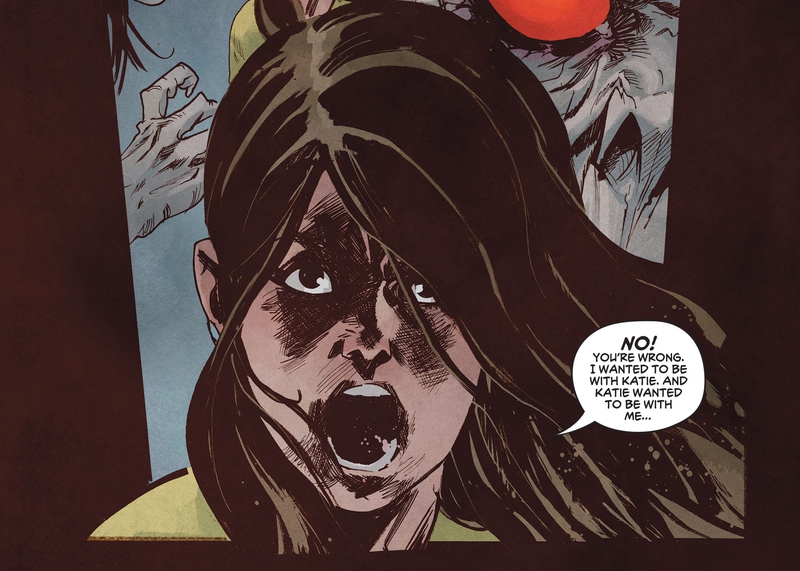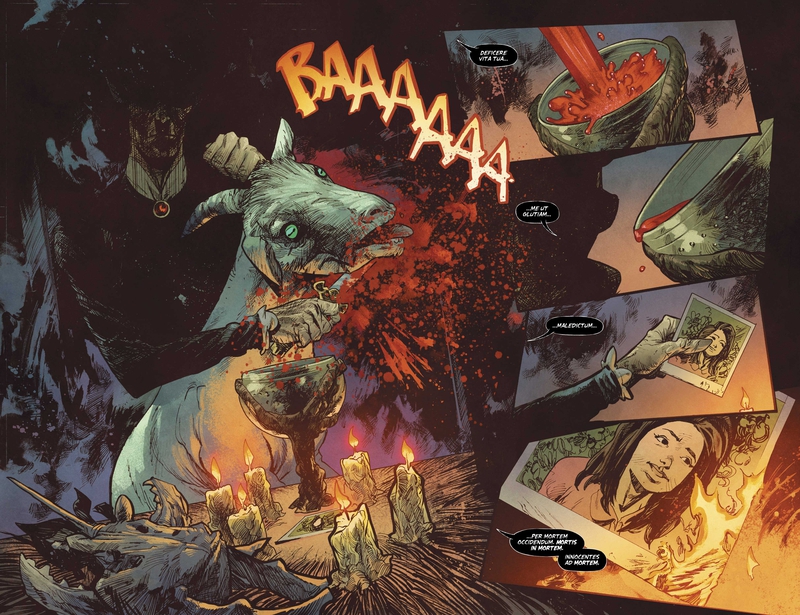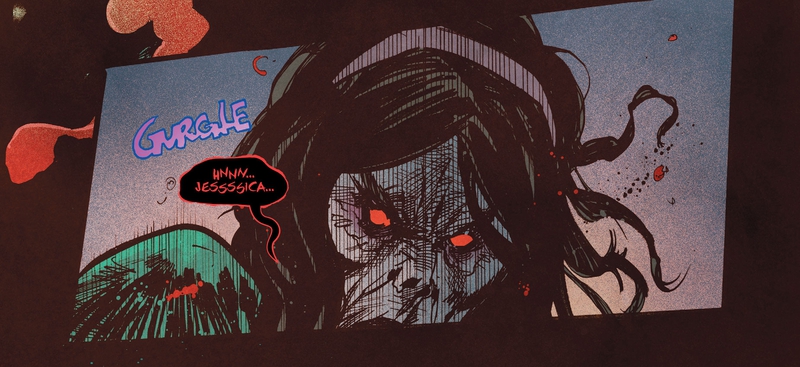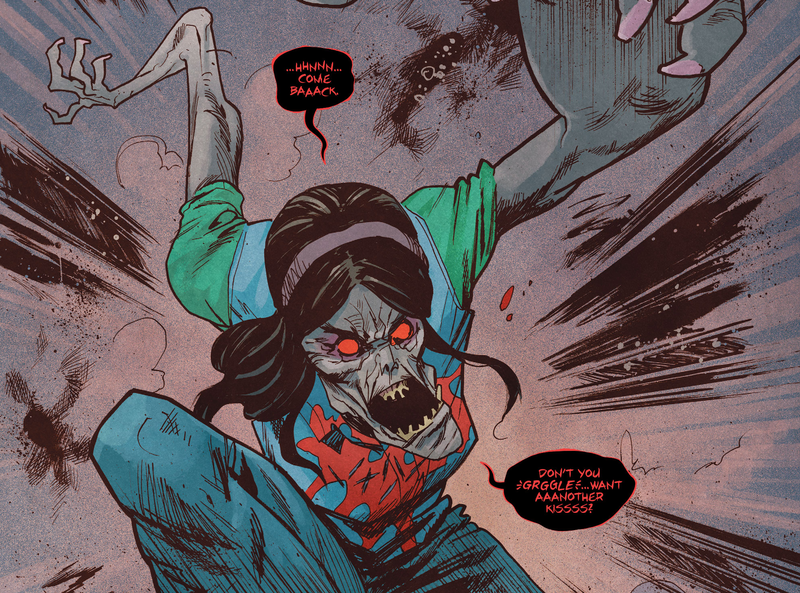The comic industry has a lot of roots in the genre of horror, so it's only fitting for The Conjuring universe to begin its expansion off the big screen into the ink of a comic book. The Conjuring: The Lover is the first book from the new DC Comics imprint DC Horror and the first Conjuring story to expand off the screen. David L. Johnson-McGoldrick, screenwriter of The Conjuring 2 and The Conjuring: The Devil Made Me Do It, is joined by New York Times bestselling author Rex Ogle (Free Lunch, Death of Wolverine: Life After Logan, Teen Titans) to tell a story set before the latest film in the franchise with direct ties to the series. The co-writers are joined by Garry Brown on art, Mike Spicer on colors, and Becca Carey on letters. The series finale hits stores on October 5th from DC Comics.
The Conjuring: The Lover follows Jessica, a college freshman starting her second semester with all of the anxiety of her first semester's mistakes. Low grades, the awkwardness of being pursued by a boy she wishes she never slept with, and the unending feeling that she's being watched. It doesn't take long for Jessica to realize she is the target of something supernatural, but why would something demonic have its eyes on a normal college girl?
FANGORIA spoke with David L. Johnson-McGoldrick and Rex Ogle about the story, how they approached bringing the same feeling to the comic as the film, and how they approached writing a queer horror story.
What were the advantages of telling The Conjuring: The Lover as a comic versus telling it in another medium?
David L. Johnson-McGoldrick: For me, I think what the comic form lent to it was that it was never even a big enough story to get in the movie. You know what I mean? It was always a little story. But it was always really important to me. We introduce these characters, and they die immediately. But in my head, I had to write them. I kind of had to love these characters and love their story. But it was never quite "what do you do with it?" it's more like their backstory is gonna be in the back of my head. I can tell people about it if they ask me, but that's all it's ever going to be. Then when we got the call about possibly doing this as a comic book, it felt like that's the size of the story. It felt like a way that we didn't have to blow it up. We didn't have to make it a bigger story than we had to. We had exactly the amount of time we needed to tell this story. And it felt like a perfect size story for what they had in mind.
Rex Ogle: And we got to put in as many scares and creepy things as we wanted!
How did you approach telling a queer horror story set in a time where it was even less accepted than it is today?
Rex Ogle: For me, you know, I'm gay, and I grew up in the '80s, in Texas, so I really relied on a lot of that stuff. I delved in, and I kind of thought about my college experience and where I was at. I was in a very similar place as Jessica. So it was actually both easy and difficult for me. Easy because it was something that was accessible to me, but also difficult reliving some negative traumas in the past.
David L. Johnson-McGoldrick: I think that's one of the things you might feel on the page. When you're reading the story, you're feeling that anger. It comes out of the book in a really effective way that really grabbed me when we were writing the scripts.

What would you say some of the major themes of the story were?
David L. Johnson-McGoldrick: I'll let Rex sort of take the meat of this one. But to me, thematically, a lot of times in The Conjuring stories, it's stories about people who are harassed by demons. But if you look underneath the surface, particularly in The Conjuring 1 and 2, in Act One, even before that, the families start being haunted. They are families with demons. In The Conjuring 2, the family is desperately poor. Their lives are sort of desperate, and they're uncertain. They have personal demons before they have actual demons. I think one of the things that Rex did so well was to create a character who had personal demons that then become dramatized in the supernatural form.
Rex Ogle: That intersectionality of internal versus external demons is really important thematically. In college, I developed panic attacks. So every time Jessica was being attacked by a demon, it was very much like those internal voices saying all those horrible negative things. I think that a lot of people go through that in college, you're away from home, you're away from family, you're feeling cut off, you're feeling isolated and alone. These are all universal feelings. We really wanted to push that in the book.
What was the process of developing the ads and backup stories in the series?
David L. Johnson-McGoldrick: The backup stories, honestly, I purposely didn't want anything to do with it because I am a giant horror comic book fan. I wanted to see them, I wanted to read them, and I wanted to experience them. They're in our book, but I didn't want to chime in on them. I just want to get them like everybody else. The ads were really one of the first things that I thought of as a fan of horror comics growing up. One of my first comic books was this old Gold Key Twilight Zone comic. I have a lot of fond memories of that era of comics, and that sort of elicit quality of it, especially if you look back historically with EC where they're like, "the government's trying to figure out what these comic books are doing to our children's brains." There was this feeling of I have to get this and I have to hide it, I can't let my parents know that I'm reading this. I had so much fun with that as a kid. I asked how we bring that vibe to this and not only make it scary but also make it fun and sort of harken back to the DNA of horror comics. So the work that's been done on those ads was fantastic as well. I love the designs on those, but it's a completely different David Johnson doing the art and lettering on those, by the way, that's not me.
Rex Ogle: It's a nice break from the heavy and the horror. It's campy and fun. For me, it harkens back to the old comic book ads, but it also reminds me of really campy cheesy horror movies that I absolutely love to both laugh at and get scared by.

Were there any specific horror comics that inspired how you approached writing The Lover?
David L. Johnson-McGoldrick: In terms of modern horror comics, Junji Ito is really the sunrise-sunset. It's one of the first times I really realized how cinematic a comic book could be and how by manipulating the panels, you are able to create that sort of edge of your seat kind of suspense. Rex and I sort of bonded early about Junji Ito, so for me that was a big inspiration.
Rex Ogle: When I was a kid I used to go to the thrift store and buy comics for like a quarter and I picked up like the old Tales from the Crypt. More recently, it's been books like American Vampire and Gideon Falls. I just reread Gideon Falls, and that art is so good. Those were things that inspired me to really want to push this comic.
With this comic being in The Conjuring universe, was there anything you did specifically to make it fit the thematics and the kind of vibe that the films have?
David L. Johnson-McGoldrick: I think that comes back down to finding the cinematic aspect of comics, and there have been so many poor comic book adaptations of motion pictures. It's so strange to me because the first thing you do is make a storyboard and kind of make a comic book of your movie before you make your movie. I think what we were able to do, and what Rex did really well too, was create this sort of cinematic feeling, especially in those early issues where we're keeping the structure of a Conjuring film where you don't start off at 100 miles per hour. Well, The Conjuring 3 started off at 100 miles an hour but normally, with the first two films, it's slow. Garry Brown and Rex, in terms of how the panels are structured and how it was written with things like Jessica in the library and the lights going down the darkness creeping in, it gives you the feeling like one of the James Wan movies. Where it's the cameras pushing through the house and the darkness creeping in. It was really embracing the cinematic aspect of it. I think it helped translate the franchise to the new format.

With comics having such deep roots in the heart, do you think this is a good place to keep fleshing out The Conjuring universe? Would you want to return to write more?
David L. Johnson-McGoldrick: I for sure would! Rex, you game?
Rex Ogle: Absolutely. I would love that more than anything.
David L. Johnson-McGoldrick: I think one of the things that was fun about it was that they did so well in terms of crafting this franchise that there are all these little nooks and crannies. There are a lot of dark corners in that artifacts room. They're not all going to warrant a feature-length motion picture. If there are little stories like the ones that you've been able to do with the artifact room, it's a place where you don't have to have 90 minutes of content necessarily to tell the story. I think this is how we proved that it works in this medium.
Rex Ogle: I grew up watching Friday the 13th: The Series, which was a Canadian TV show that almost had a similar premise in that it was a pawn shop full of these satanic relics that had all kinds of demonic powers. If we could do that with The Conjuring universe and explore that, that would be a dream.
With comics being such a collaborative process, what kind of notes did you give to the art team? Was it back and forth between teams to create the vibe you're looking for?
Rex Ogle: David and I wrote a script, and we had a lot of back and forth, which was really amazing because he kept me in The Conjuring universe. Because sometimes I would want to go a little bit too wild, and he'd be like "no, dial it back," or he would be the opposite and say to "push more here." That was great. With the artists, Garry Brown just did such a good job of taking the script and then just going with it.

What do you think it is about the genre of horror that allows creators to explore themes in a different way than other genres would?
David L. Johnson-McGoldrick: I like all kinds of horror, so this is going to sound like I'm being snooty or sticking my nose up at other kinds of horror. I love everything, from Roger Corman to The Exorcist, and everything in between. There's something I like about every version of the genre of horror. I think one of the things that when horror is most effective to me is when you're able to explore scary themes in a cathartic environment. That you're able to find real life horror and explore it in a safe spot. Movies like The Body Snatchers and The Thing are speaking to paranoia. The Fly was emblematic of the body horror of the AIDS epidemic. You can use things that you would maybe not want to necessarily make a movie specifically about. You can step to the left with horror and tell a story that doesn't appear on the surface to be about that at all. But when you realize why you're scared and start analyzing why you're scared, you're realizing that it's actually tapping into something really deep. It may even tap into things you're not even aware of.
Rex Ogle: For me, death and dying is the scariest thing in the world. Horror taps into that in a way that no other genre does because it forces you to kind of confront that fear. Sometimes for the good and sometimes for the bad. I know that there are movies like The Strangers that I just cannot watch again because it's just terrifying.
The Conjuring: The Lover issues #1-5 are now available






